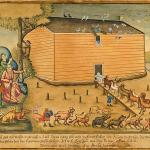When you recommend worldview w-w as Protestants have ever since Francis Schaeffer popularized some of Abraham Kuyper’s ideas, it may come as a surprise when you also praise the outlook of authors and editors who are not necessarily Christian, at least for understanding the past.
But that is exactly what Thomas Kidd does in a recent post about choosing books about history:
There are three great ways to discern the intellectual value of a book. First, consider the author’s profile. Does the author have a position or track record that would suggest that he or she is a qualified expert in the topic? If you’re reading on a specifically Christian history topic, for example, does the person hold a position at a seminary or similar scholarly employer that suggests they have credentials and trustworthiness? Conversely, one of the most common warning signs is when an author parlays political, religious, or media connections in order to write on a history topic on which they (or their co-author/ghost writer, who did most of the work) have no obvious expertise.
… Second, look at the publisher. Some publishers traffic mainly in junk food history, while others stake their brand on publishing highly qualified, respected authorities. (I am speaking here mostly of the secular publishing business; many at TGC know the Christian publishing business far better than I do.) Trade publishers like Knopf and Basic Books, and academic houses like Yale and Oxford University Press, base their reputations on doing books that are readable but are serious, influential, and academically credible. Rarely books at such presses turn out not to be credible, but in general these are the types of presses that base their business on hitting the sweet spot—intellectual seriousness plus readability. (Major academic presses like Oxford tend to have both academic and trade book divisions—their books that are priced less than about $30 are the trade books.)
Finally, use reliable sources to vet books before you buy. The primary reason that I subscribe to The Wall Street Journal is because of their book reviews (daily, and in their weekend book review section). They generally only review books from credible authors and presses, and use credentialed experts to do the reviews. Reading reviews in the Journal, the New York Review of Books, and similar outlets, introduces me to a wide range of books that I might be interested in reading, but are not in my field. (It is part of my job to keep up with books in colonial and Revolutionary American history, the history of evangelicalism, and related topics—I tend to find out about such books through more specialized academic sources like history journals.)
The closest Kidd gets to a Christian w-w is in the first point. You may want to read someone who teaches at a seminary if you’re going to read about Christian history. Otherwise, the editors at trade presses like Basic Books or at university presses such as Oxford and Yale are likely not going to be readers of The Gospel Coalition’s publications. The same goes for the book review editors at the Wall Street Journal or New York Review of Books.
This is a rare recognition of the value of non-Christian worldviews outlooks. It makes sense since Kidd himself publishes at these presses and as a member of the academic guild he regularly relies on scholars who have no stake in matters of faith but have lots of insights into the past. This is why the insistence of worldview w-w thinking makes little sense.
By the way, Kidd’s point about junk food vs. academic history is one that could well extend to the world of Protestant theology. Protestants have plenty of outlets for popular theology — Ligonier, Gospel Coalition, Modern Reformation, and Reformation 21 come to mind. And they also have academic theology published in journals such as Calvin Theological Journal, Westminster Theological Journal, and The Journal of the Evangelical Theological Society. But what about a middle brow theological journal, one that is not written for academics but also not designed to teach basic doctrine to the uninitiated? Where do you go to read an author work out theological questions in a non-technical way? Roman Catholics do this at publications like First Things, Commonweal, and America. Why can’t Protestants do that also?















